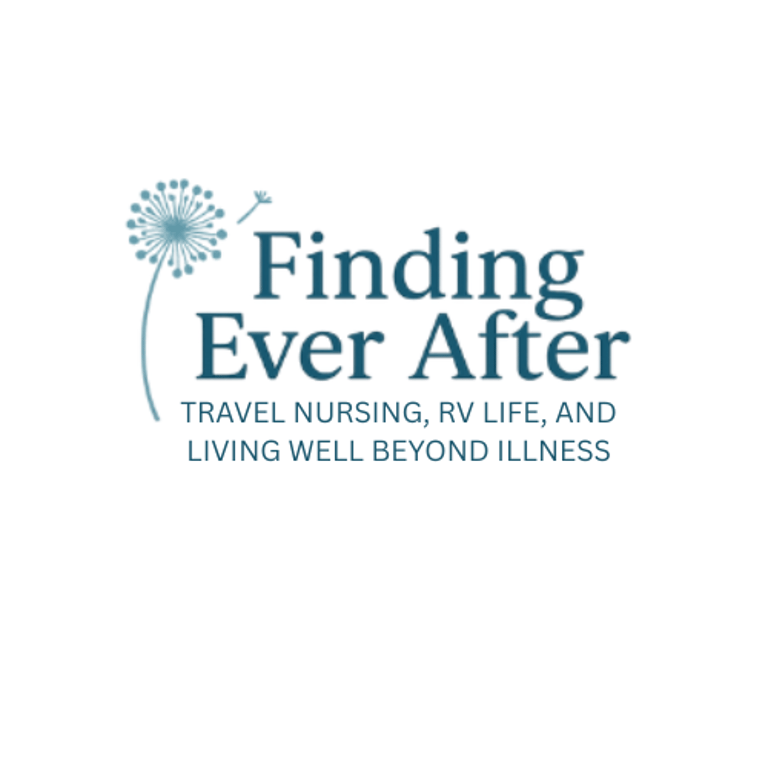Is RV Life Right for Travel Nurses? Pros, Cons, and My Experience
Is RV life right for travel nurses? Here’s an honest look at the pros and cons from a seasoned RN living in a 42-foot fifth wheel. Compare RV campground costs vs. rentals, explore the comforts of home, and learn tips for thriving on assignment.
TRAVEL NURSING & CAREER
Velvet Larrabee
9/7/20256 min read
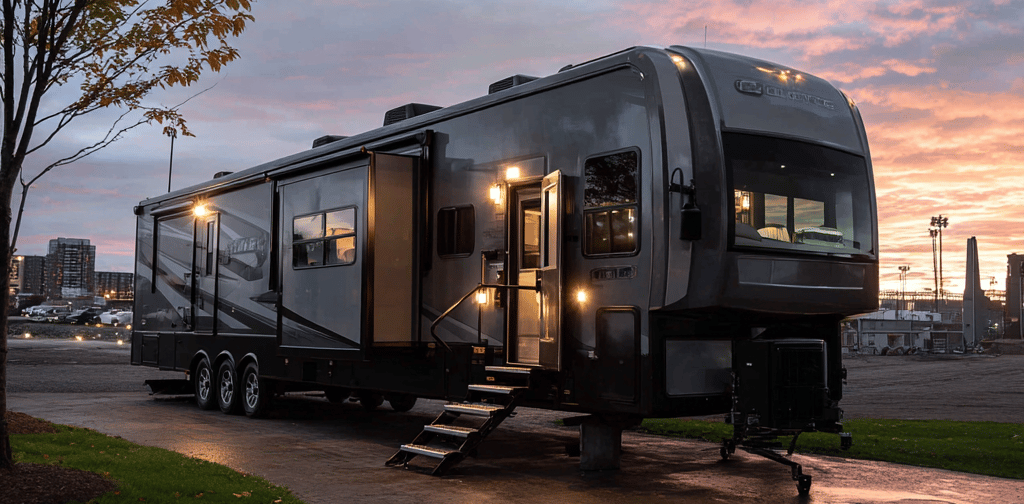

When I tell people I’m a travel nurse who lives full-time in a 42-foot fifth-wheel camper, I usually get one of two reactions:
“That’s amazing—I wish I could do that!”
“Wow… don’t you get tired of living in such a small space?”
The truth? RV life isn’t for everyone—but for me, it’s been one of the best decisions I’ve made in my travel nursing journey. After a long shift, I step out of the hospital, walk through the door of my RV, and I’m instantly home. My bed, my kitchen, my things, my little corner of peace—it’s all waiting for me, no matter what city or hospital I’m in.
If you’re considering combining travel nursing with RV living, I want to give you an honest look at the lifestyle. I’ll share what’s worked for me, what’s been challenging, and how to decide if it’s right for you.
Why RV Life Appeals to Travel Nurses
Travel nursing is an adventure on its own—but adding RV life gives it a whole new twist. Here’s what makes it so appealing:
Consistency: No matter where you’re working, you’re always coming back to the same home.
Comforts of home: Your own bed, kitchen, shower, and space you’ve made yours.
Pets & loved ones: Bring your spouse, kids, or fur babies along for the ride.
Cost savings: Campgrounds can be much more affordable than short-term rentals.
Community: RV parks are often filled with friendly neighbors and fellow travelers.
But it’s not all campfires and sunsets. Let’s break down the pros and cons.
The Pros of RV Life as a Travel Nurse
1. You’re Always Home, No Matter Where You Work
For me, this is the biggest perk. In traditional travel nurse housing, you’re unpacking, settling in, and then three months later, packing up again. With an RV, you just move your house. After a long shift, you walk into your own familiar space. The sense of stability is priceless.
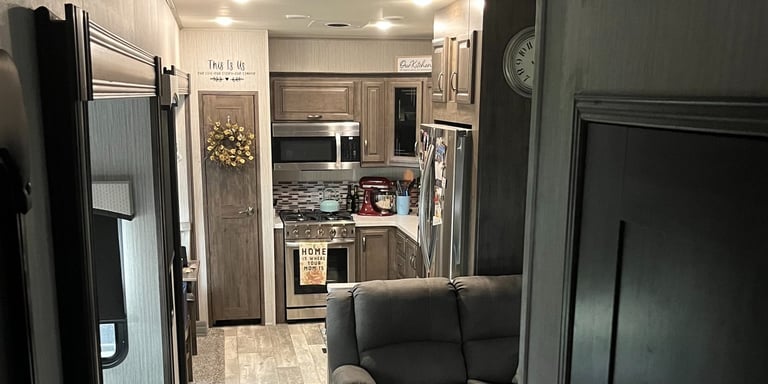

2. A Kitchen of Your Own
Eating out on assignment can add up quickly—not just in money, but also in health. Having my own kitchen means I can meal prep, cook healthy food, and save money. Plus, nothing beats coming home and making comfort food after a tough shift.
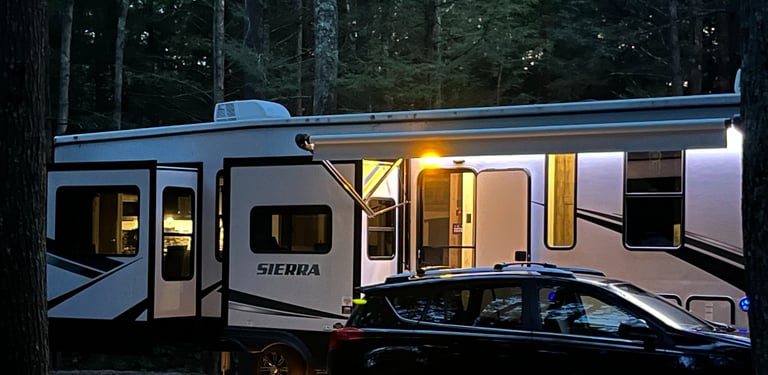

3. Pets & Family Can Come Along
Many travel nurses struggle with leaving pets or loved ones behind. With an RV, they can come with you. My cat, Jazz, has his favorite spots by the window, and having him along makes every assignment feel less lonely.


4. Cost Savings vs. Rentals
Campground rates vary, but they’re often significantly cheaper than short-term furnished rentals—especially if you book a seasonal site. A furnished one-bedroom near a hospital might cost $2,000–$3,000/month. By comparison, I’ve paid around $600–$1,200/month for full hook-up RV sites, depending on location. Over the course of a year, that’s thousands saved.
5. Flexibility in Where You Live
You’re not tied to the hospital’s neighborhood. Want a scenic lake view instead of a noisy apartment complex? You can choose a campground that gives you peace after a long shift.
6. Built-In Community
RV parks have their own little culture. Neighbors wave, share tips, and sometimes become lifelong friends. For a lifestyle that can feel isolating, this sense of community is refreshing.
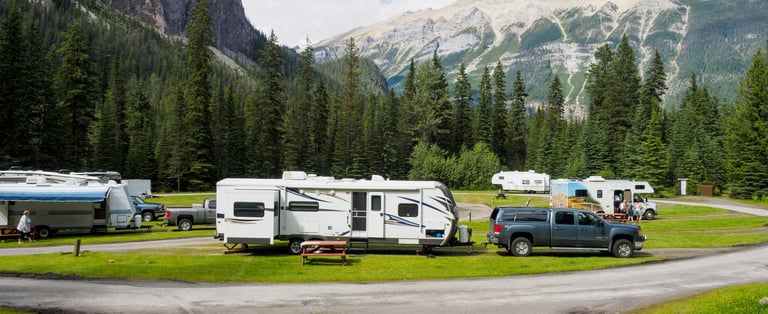

The Cons of RV Life as a Travel Nurse
1. The Initial Investment
RVs aren’t cheap. A well-kept fifth-wheel and a truck to tow it can cost anywhere from $60,000–$150,000+. It’s a big upfront investment, and you’ll need to crunch the numbers to make sure it makes sense for you.
2. Maintenance and Repairs
Your RV is both your house and your car—which means double the maintenance. Water heaters, slide-outs, AC units, tires… things will break. If you’re not handy (or don’t want to become handy), this can be stressful.
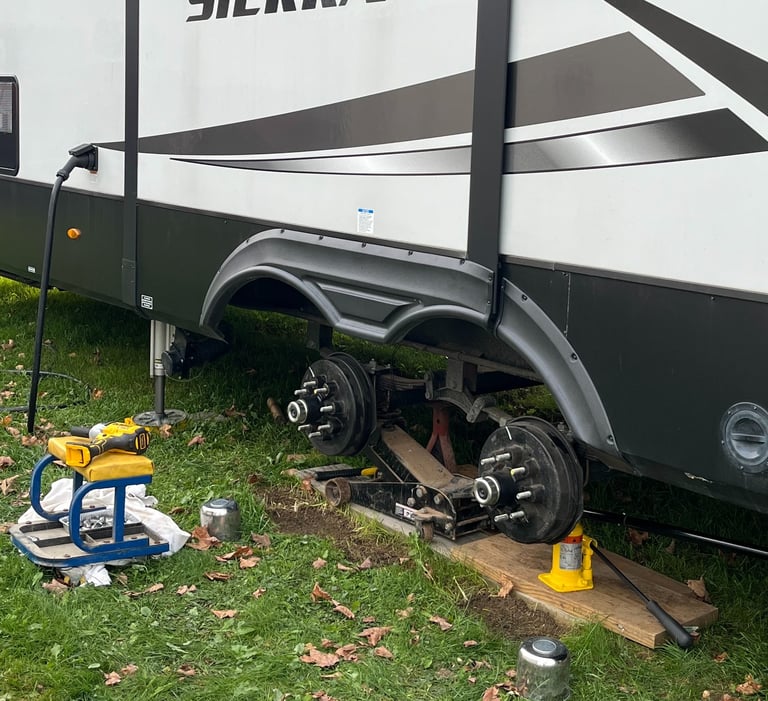

3. Finding Campsites Near Hospitals
Not every city has convenient campgrounds close to your assignment. Sometimes you’ll face longer commutes, especially in big urban centers. Planning ahead is essential.
4. Seasonal Considerations
Wintering in the north? Expect frozen hoses and higher heating costs. Summer in the south? Your AC will work overtime. The RV lifestyle is doable year-round but requires planning.
5. Limited Space
A 42-foot fifth-wheel is spacious by RV standards, but it’s still less room than most apartments. If you don’t enjoy a minimalist lifestyle or get claustrophobic easily, it might feel restrictive.
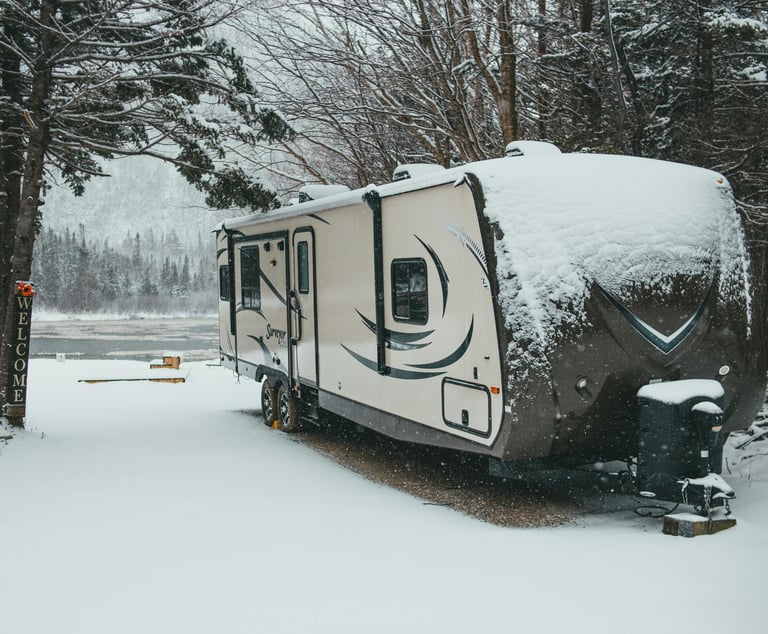

Renting vs. Campground Living: Cost Comparison
Let’s talk numbers, because cost is one of the biggest decision points.
Example: 13-week assignment in a mid-sized city
Short-Term Rental (furnished, utilities included):
$2,200/month x 3 months = $6,600
Plus possible pet deposits and cleaning fees
Campground Seasonal Rate (full hook-up):
$800/month x 3 months = $2,400
Utilities often included in site fee
Savings: Roughly $4,200 over the length of a standard contract.
Of course, this doesn’t account for the cost of owning and maintaining an RV. But once that initial investment is made, the ongoing costs often favor campground living—especially if you consistently take assignments.
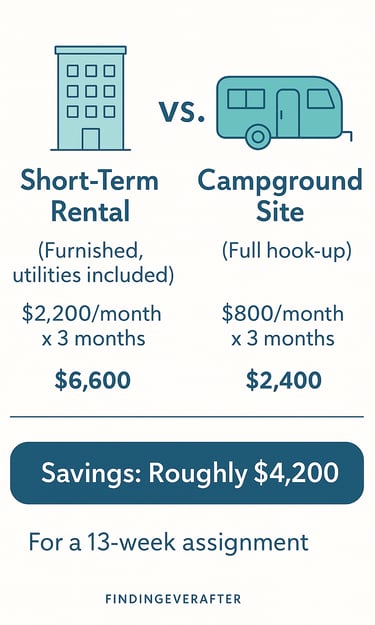

Tips for Making RV Life Work as a Travel Nurse
1. Book Campsites Early
Travel nurse contracts move fast, and campgrounds fill quickly—especially in popular areas. As soon as you accept an assignment, start calling around.
2. Consider Seasonal Rates
If you think there’s a chance you’ll extend your contract, it often makes sense to rent a seasonal site. These are usually cheaper monthly, and you won’t have to scramble for housing if you stay longer.
3. Invest in Good RV Gear
A heated water hose, surge protector, leveling blocks, and reliable internet setup (like a mobile hotspot or Starlink) will make life much smoother.
4. Keep a Tool Kit Handy
RV life requires some DIY skills. Having basic tools on hand can save you time and frustration when things go wrong.
5. Build a Routine
It’s easy to feel unmoored when your environment changes every few months. Having a morning or evening routine—whether it’s making coffee, journaling, or a quick walk—adds a sense of stability.
6. Prioritize Safety
Choose campgrounds that feel safe, are well-lit, and have good reviews. Always trust your instincts.
Is RV Life Right for You?
Here are a few questions to ask yourself:
Do you enjoy a minimalist lifestyle, or do you need lots of space?
Are you comfortable with the idea of handling RV maintenance and repairs?
Do you plan to take multiple contracts per year (making the investment worthwhile)?
Do you want to travel with pets or loved ones?
Does the thought of having your own home everywhere you go make you feel relieved or stressed?
If your answers lean toward flexibility, adventure, and comfort with a little DIY, RV life could be a perfect fit.


My Experience Living in a 42-Foot Fifth Wheel
When I first hit the road, I wasn’t sure how long it would last. But now, years later, I can honestly say I wouldn’t trade it.
Some of my favorite moments:
Watching the sunrise with a cup of coffee outside my RV before heading into a new hospital.
Hosting coworkers for a home-cooked meal in my camper after a rough week.
Curling up with my cat in our familiar space, even when everything else around us was new.
Yes, there have been breakdowns, cold nights, and frustrating campground searches. But the freedom, consistency, and sense of home outweigh the challenges for me.
Final Thoughts
RV life as a travel nurse isn’t one-size-fits-all. For some, it’s the perfect blend of adventure, comfort, and financial sense. For others, the maintenance, space limitations, or upfront costs make it a poor fit.
If you’re curious, I encourage you to start small: rent an RV for a short trip, or talk to other travel nurses who live this way. See how it feels before committing.
For me, the best part is this: at the end of every shift—no matter how chaotic or exhausting—I walk into my own home. My bed, my kitchen, my little sanctuary. And that has made all the difference.
Click to check out this step-by-step guide to getting started as a travel nurse.
👉 Thinking about RV life as a travel nurse? Drop your questions or worries in the comments—I’d love to share what I’ve learned and help you figure out if this lifestyle is right for you.
